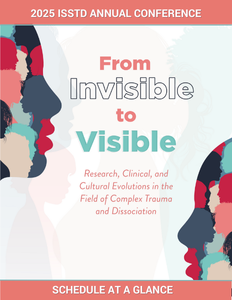Back
Posters
Poster Judging Hour
The Ecology of Healing: Outcomes of a Culturally Adapted Group ACT Intervention to Address Internalized Racial Trauma for Multiracial Therapists
Friday, March 14, 2025
6:00 PM – 7:00 PM US Eastern Time

Amelia Ortega, DSW LCSW (they/them/theirs)
Psychotherapist
Amanecer Counseling, LLC
Wakefield, Rhode Island, United States
Abstract
This poster presents the design of and findings from a 2024 clinical study exploring the implementation of a culturally adapted Acceptance and Commitment Therapy (ACT) intervention aimed at addressing symptoms of racial trauma among multiracial individuals, specifically targeting mental health professionals. Multiracial individuals experience unique forms of minority stress, yet existing evidence-based practices related to racial trauma primarily cater to monoracial groups.
Racialized trauma, and internalized racial oppression have been correlated positively with psychological distress, negative self-esteem, low self-worth, decreased self-efficacy, and social isolation (Willis et al., 2021, Gale et al.,2020). This research specifically targeted the consequences of racial isolation and negative self-beliefs regarding belonging for multiracial identified adults. Using a mixed methods approach, this project’s research questions specifically explored the impact of racial isolation, and negative self-beliefs on mental health providers capacity to engage with opportunities to belong within professional and community based racial affinity groups.
The outcomes of this study indicate a need for community-based, relational approaches to addressing racialized violence's mental health implications for multiracial adults. The study’s findings offer potential for broader dissemination and replication within trauma specializing communities of practice. Findings indicated statistically significant impact of the culturally tailored ACT group, and the study contributes to understanding the often-invisible relationships of racial trauma, identity, belonging, and mental health. These findings are particularly relevant as multiracial (MR) individuals are the fastest growing demographic in North America, expected to increase by more than 200% between 2016 and 2060 (U.S Census Bureau, 2018 as cited in Nishina & Witkow, 2020). Lastly, the study’s findings substantiate the need for more BIPOC centered, culturally tailored approaches within the field of trauma studies and continued BIPOC centered evidence-based practice research. This research was completed through SUNY Buffalo’s Doctorate in Social Welfare, Social Work Practice program, May 2024, IRB Study:00007508.
This poster presents the design of and findings from a 2024 clinical study exploring the implementation of a culturally adapted Acceptance and Commitment Therapy (ACT) intervention aimed at addressing symptoms of racial trauma among multiracial individuals, specifically targeting mental health professionals. Multiracial individuals experience unique forms of minority stress, yet existing evidence-based practices related to racial trauma primarily cater to monoracial groups.
Racialized trauma, and internalized racial oppression have been correlated positively with psychological distress, negative self-esteem, low self-worth, decreased self-efficacy, and social isolation (Willis et al., 2021, Gale et al.,2020). This research specifically targeted the consequences of racial isolation and negative self-beliefs regarding belonging for multiracial identified adults. Using a mixed methods approach, this project’s research questions specifically explored the impact of racial isolation, and negative self-beliefs on mental health providers capacity to engage with opportunities to belong within professional and community based racial affinity groups.
The outcomes of this study indicate a need for community-based, relational approaches to addressing racialized violence's mental health implications for multiracial adults. The study’s findings offer potential for broader dissemination and replication within trauma specializing communities of practice. Findings indicated statistically significant impact of the culturally tailored ACT group, and the study contributes to understanding the often-invisible relationships of racial trauma, identity, belonging, and mental health. These findings are particularly relevant as multiracial (MR) individuals are the fastest growing demographic in North America, expected to increase by more than 200% between 2016 and 2060 (U.S Census Bureau, 2018 as cited in Nishina & Witkow, 2020). Lastly, the study’s findings substantiate the need for more BIPOC centered, culturally tailored approaches within the field of trauma studies and continued BIPOC centered evidence-based practice research. This research was completed through SUNY Buffalo’s Doctorate in Social Welfare, Social Work Practice program, May 2024, IRB Study:00007508.

